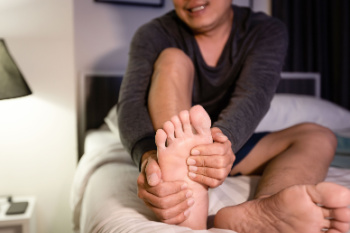
Plantar fasciitis, or inflammation of the plantar fascia, often leads to heel pain. This condition affects approximately 10 percent of the population at some point, with a higher prevalence in women and individuals between 40 and 60 years old. The plantar fascia is a thick band of tissue that runs from the heel to the toes. It supports the foot's arch and absorbs shock. Plantar fasciitis is considered an overuse injury. It is caused by standing for long periods, engaging in high-impact sports, or wearing poorly supportive shoes. These actions can cause microtears in the tissue, resulting in inflammation and pain. Key treatment strategies include resting the feet, avoiding activities that contribute to the pain, and taking pain relievers. Stretching exercises for the calf muscles and plantar fascia, often recommended by a podiatrist, can enhance recovery by improving strength and flexibility. Custom orthotic inserts may also provide additional support and comfort. If you are experiencing heel pain, it is suggested that you schedule an appointment with a podiatrist for an exam and treatment options.
Plantar fasciitis is a common foot condition that is often caused by a strain injury. If you are experiencing heel pain or symptoms of plantar fasciitis, contact Michael Schwartzman, DPM from Illinois and Indiana . Our doctor can provide the care you need to keep you pain-free and on your feet.
What Is Plantar Fasciitis?
Plantar fasciitis is one of the most common causes of heel pain. The plantar fascia is a ligament that connects your heel to the front of your foot. When this ligament becomes inflamed, plantar fasciitis is the result. If you have plantar fasciitis you will have a stabbing pain that usually occurs with your first steps in the morning. As the day progresses and you walk around more, this pain will start to disappear, but it will return after long periods of standing or sitting.
What Causes Plantar Fasciitis?
- Excessive running
- Having high arches in your feet
- Other foot issues such as flat feet
- Pregnancy (due to the sudden weight gain)
- Being on your feet very often
There are some risk factors that may make you more likely to develop plantar fasciitis compared to others. The condition most commonly affects adults between the ages of 40 and 60. It also tends to affect people who are obese because the extra pounds result in extra stress being placed on the plantar fascia.
Prevention
- Take good care of your feet – Wear shoes that have good arch support and heel cushioning.
- Maintain a healthy weight
- If you are a runner, alternate running with other sports that won’t cause heel pain
There are a variety of treatment options available for plantar fasciitis along with the pain that accompanies it. Additionally, physical therapy is a very important component in the treatment process. It is important that you meet with your podiatrist to determine which treatment option is best for you.
If you have any questions, please feel free to contact our offices located in West Chicago, IL and Whiting, IN . We offer the newest diagnostic and treatment technologies for all your foot care needs.
